Organisational Behaviour: Culture, Power, Politics & Motivation
VerifiedAdded on 2023/06/17
|14
|4229
|385
Report
AI Summary
This report analyses organisational behaviour within Sainsbury Plc, focusing on the impact of culture, politics, and power on individual and team behaviour, and how these elements influence employee motivation. It evaluates content and process theories of motivation, such as Maslow's hierarchy of needs and expectancy theory, to determine effective strategies for employee engagement. The report also examines the dynamics of effective and ineffective teams, exploring relevant team development theories and the application of organisational behaviour concepts and philosophies. It concludes with recommendations for improving employee performance through performance appraisals and training programs, highlighting the importance of aligning organisational culture, power structures, and political dynamics with employee motivation to achieve organisational goals.
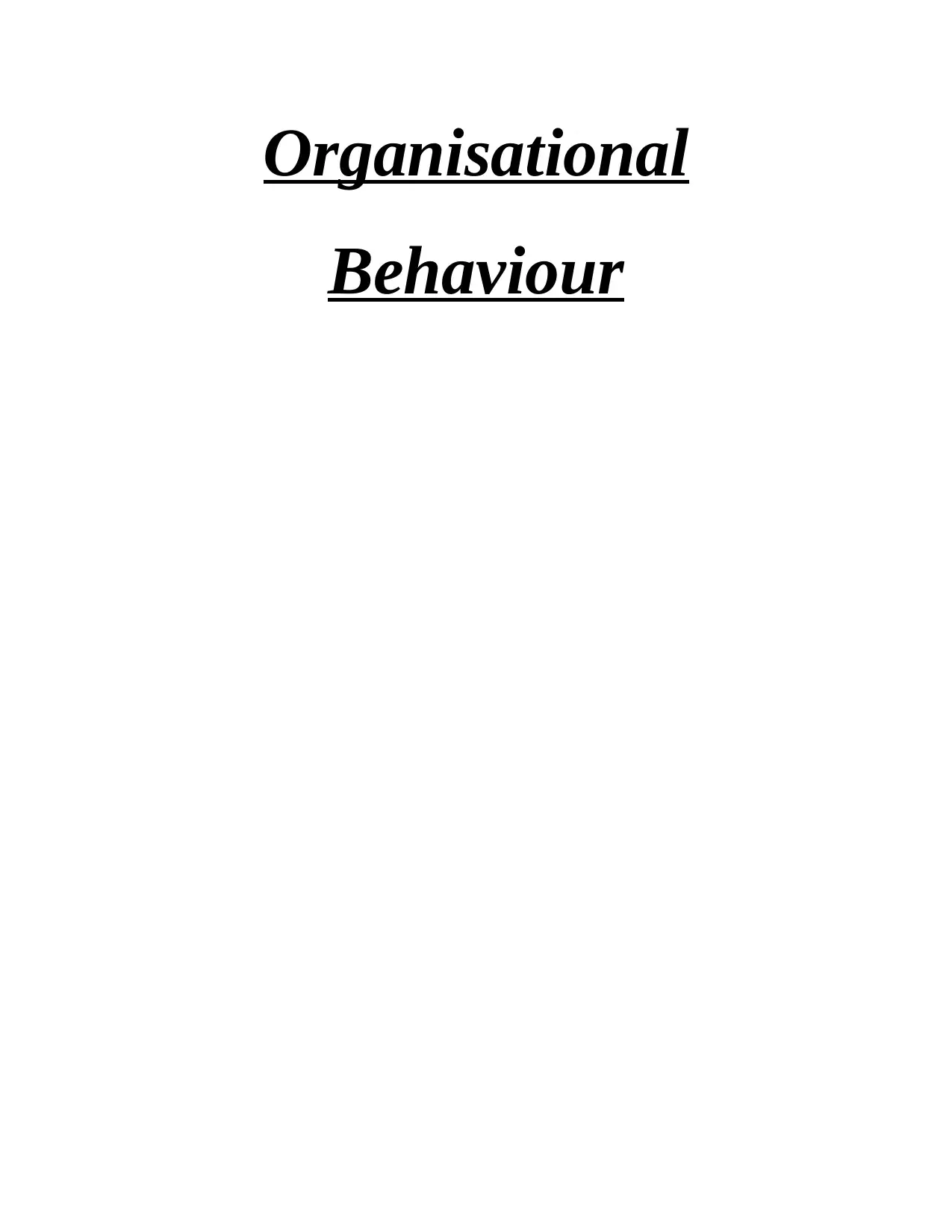
Organisational
Behaviour
Behaviour
Paraphrase This Document
Need a fresh take? Get an instant paraphrase of this document with our AI Paraphraser
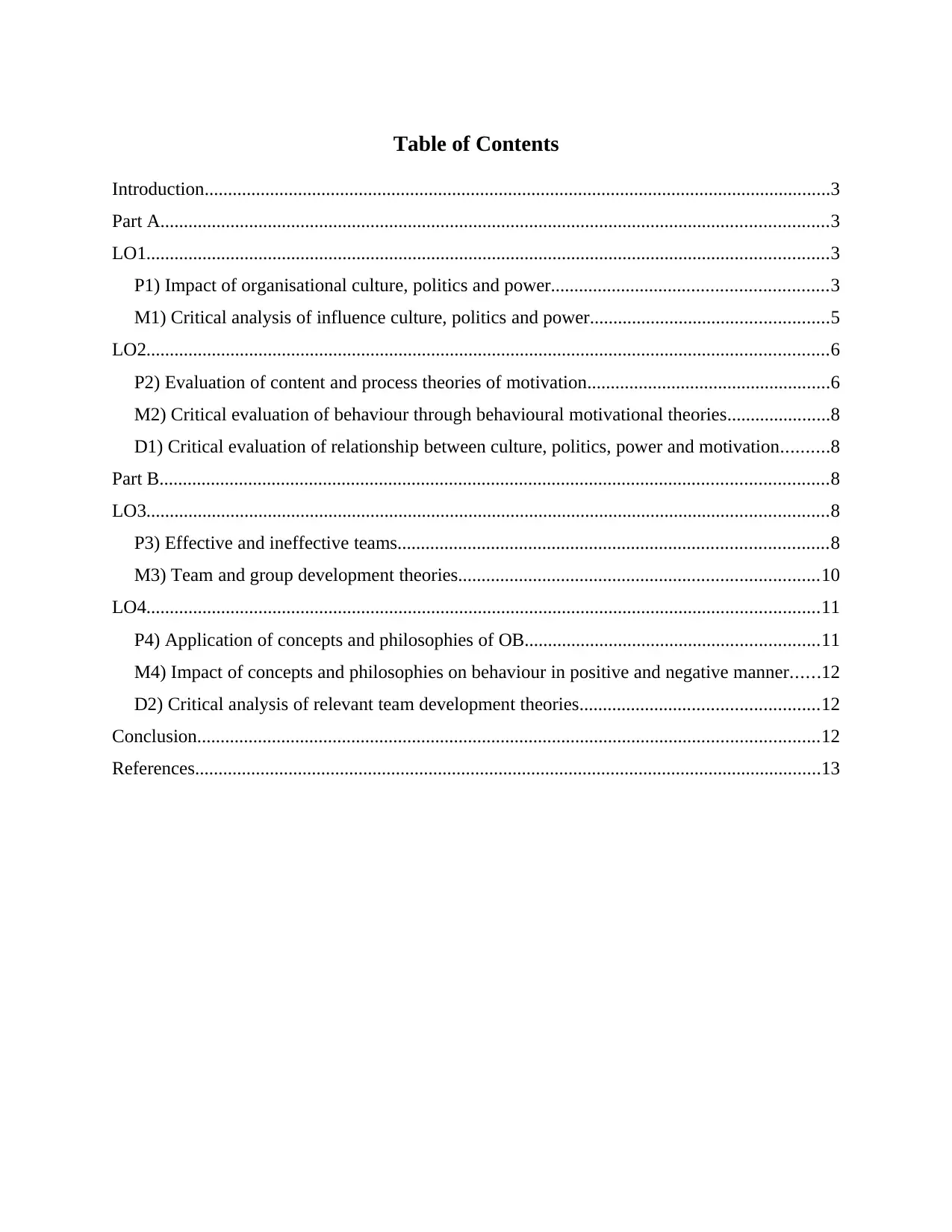
Table of Contents
Introduction......................................................................................................................................3
Part A...............................................................................................................................................3
LO1..................................................................................................................................................3
P1) Impact of organisational culture, politics and power...........................................................3
M1) Critical analysis of influence culture, politics and power...................................................5
LO2..................................................................................................................................................6
P2) Evaluation of content and process theories of motivation....................................................6
M2) Critical evaluation of behaviour through behavioural motivational theories......................8
D1) Critical evaluation of relationship between culture, politics, power and motivation..........8
Part B...............................................................................................................................................8
LO3..................................................................................................................................................8
P3) Effective and ineffective teams............................................................................................8
M3) Team and group development theories.............................................................................10
LO4................................................................................................................................................11
P4) Application of concepts and philosophies of OB...............................................................11
M4) Impact of concepts and philosophies on behaviour in positive and negative manner......12
D2) Critical analysis of relevant team development theories...................................................12
Conclusion.....................................................................................................................................12
References......................................................................................................................................13
Introduction......................................................................................................................................3
Part A...............................................................................................................................................3
LO1..................................................................................................................................................3
P1) Impact of organisational culture, politics and power...........................................................3
M1) Critical analysis of influence culture, politics and power...................................................5
LO2..................................................................................................................................................6
P2) Evaluation of content and process theories of motivation....................................................6
M2) Critical evaluation of behaviour through behavioural motivational theories......................8
D1) Critical evaluation of relationship between culture, politics, power and motivation..........8
Part B...............................................................................................................................................8
LO3..................................................................................................................................................8
P3) Effective and ineffective teams............................................................................................8
M3) Team and group development theories.............................................................................10
LO4................................................................................................................................................11
P4) Application of concepts and philosophies of OB...............................................................11
M4) Impact of concepts and philosophies on behaviour in positive and negative manner......12
D2) Critical analysis of relevant team development theories...................................................12
Conclusion.....................................................................................................................................12
References......................................................................................................................................13
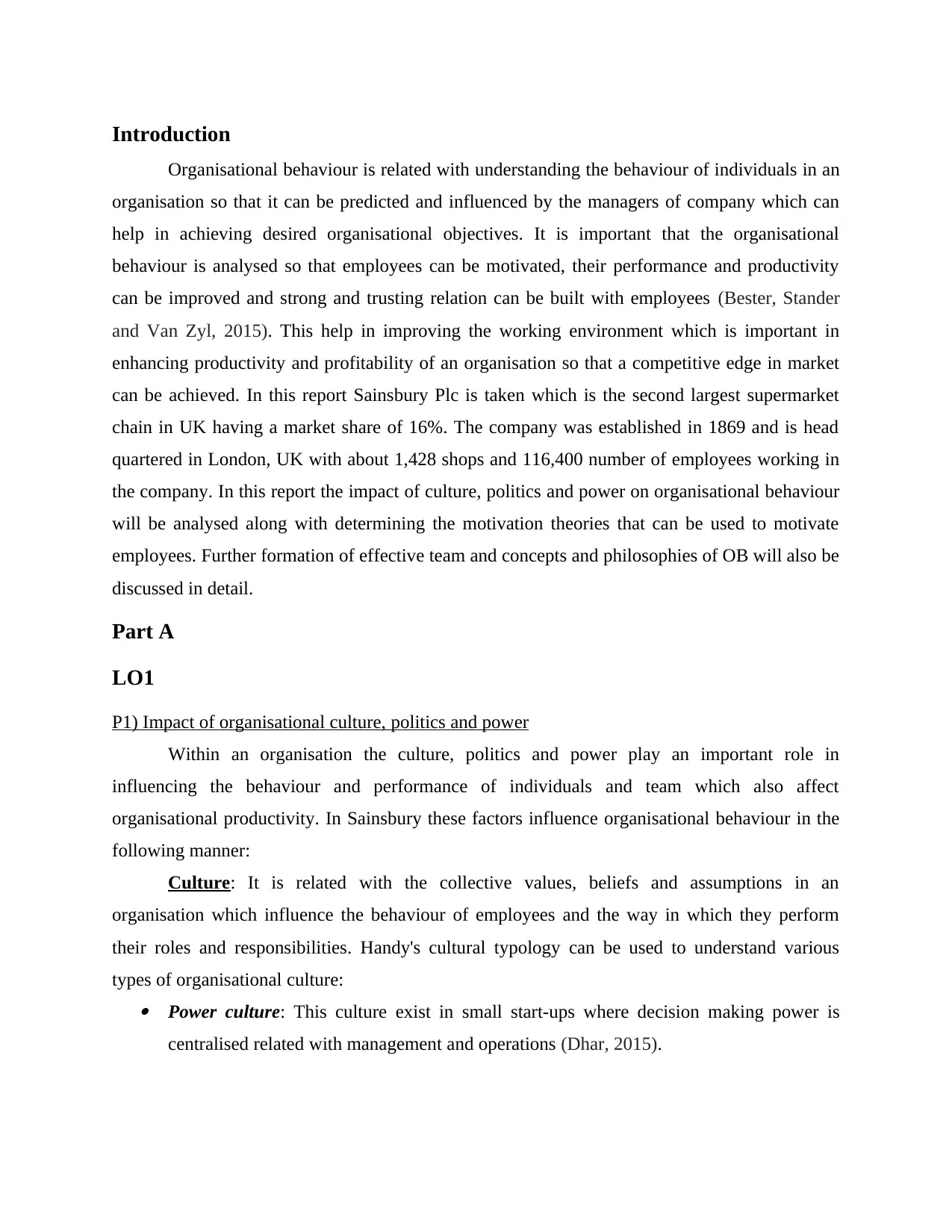
Introduction
Organisational behaviour is related with understanding the behaviour of individuals in an
organisation so that it can be predicted and influenced by the managers of company which can
help in achieving desired organisational objectives. It is important that the organisational
behaviour is analysed so that employees can be motivated, their performance and productivity
can be improved and strong and trusting relation can be built with employees (Bester, Stander
and Van Zyl, 2015). This help in improving the working environment which is important in
enhancing productivity and profitability of an organisation so that a competitive edge in market
can be achieved. In this report Sainsbury Plc is taken which is the second largest supermarket
chain in UK having a market share of 16%. The company was established in 1869 and is head
quartered in London, UK with about 1,428 shops and 116,400 number of employees working in
the company. In this report the impact of culture, politics and power on organisational behaviour
will be analysed along with determining the motivation theories that can be used to motivate
employees. Further formation of effective team and concepts and philosophies of OB will also be
discussed in detail.
Part A
LO1
P1) Impact of organisational culture, politics and power
Within an organisation the culture, politics and power play an important role in
influencing the behaviour and performance of individuals and team which also affect
organisational productivity. In Sainsbury these factors influence organisational behaviour in the
following manner:
Culture: It is related with the collective values, beliefs and assumptions in an
organisation which influence the behaviour of employees and the way in which they perform
their roles and responsibilities. Handy's cultural typology can be used to understand various
types of organisational culture: Power culture: This culture exist in small start-ups where decision making power is
centralised related with management and operations (Dhar, 2015).
Organisational behaviour is related with understanding the behaviour of individuals in an
organisation so that it can be predicted and influenced by the managers of company which can
help in achieving desired organisational objectives. It is important that the organisational
behaviour is analysed so that employees can be motivated, their performance and productivity
can be improved and strong and trusting relation can be built with employees (Bester, Stander
and Van Zyl, 2015). This help in improving the working environment which is important in
enhancing productivity and profitability of an organisation so that a competitive edge in market
can be achieved. In this report Sainsbury Plc is taken which is the second largest supermarket
chain in UK having a market share of 16%. The company was established in 1869 and is head
quartered in London, UK with about 1,428 shops and 116,400 number of employees working in
the company. In this report the impact of culture, politics and power on organisational behaviour
will be analysed along with determining the motivation theories that can be used to motivate
employees. Further formation of effective team and concepts and philosophies of OB will also be
discussed in detail.
Part A
LO1
P1) Impact of organisational culture, politics and power
Within an organisation the culture, politics and power play an important role in
influencing the behaviour and performance of individuals and team which also affect
organisational productivity. In Sainsbury these factors influence organisational behaviour in the
following manner:
Culture: It is related with the collective values, beliefs and assumptions in an
organisation which influence the behaviour of employees and the way in which they perform
their roles and responsibilities. Handy's cultural typology can be used to understand various
types of organisational culture: Power culture: This culture exist in small start-ups where decision making power is
centralised related with management and operations (Dhar, 2015).
⊘ This is a preview!⊘
Do you want full access?
Subscribe today to unlock all pages.

Trusted by 1+ million students worldwide
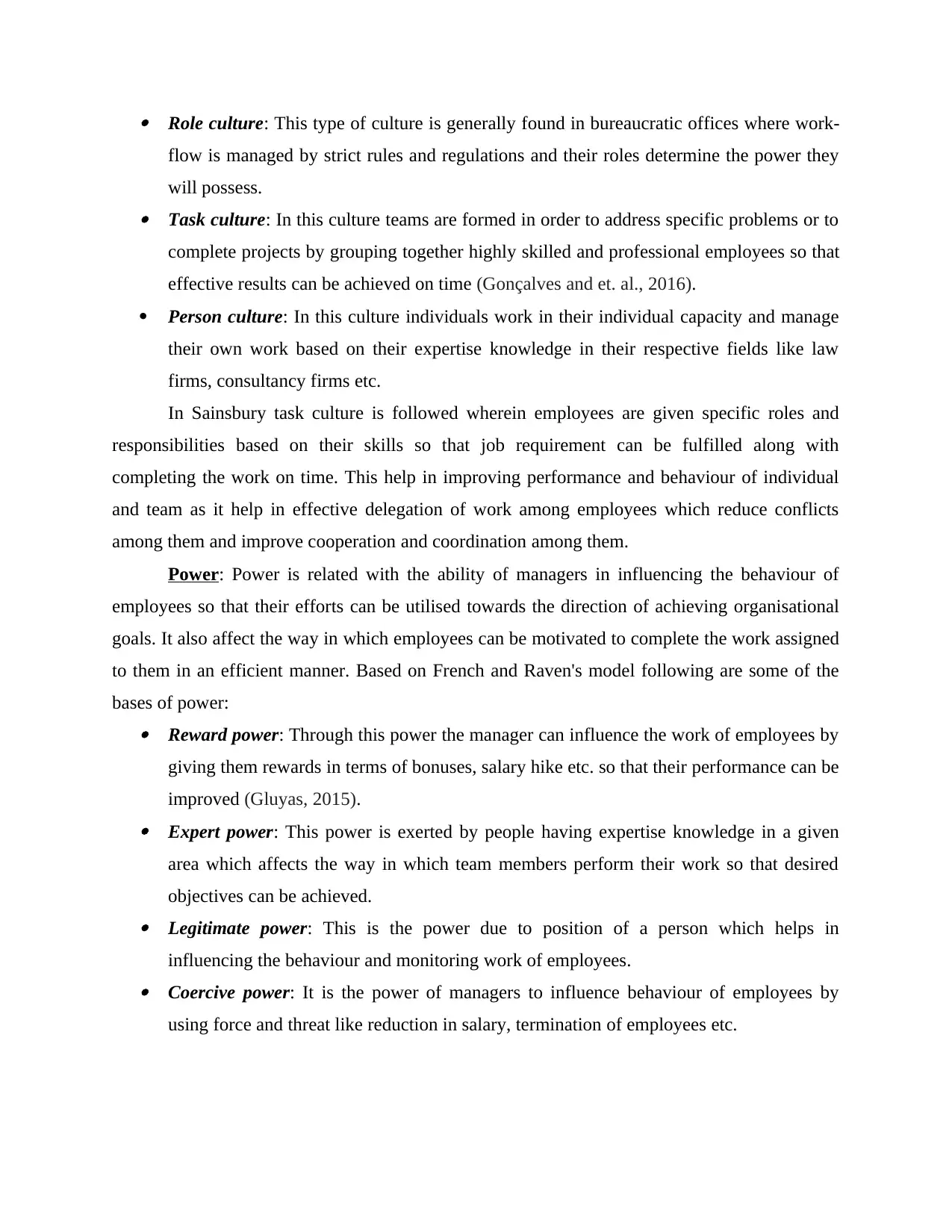
Role culture: This type of culture is generally found in bureaucratic offices where work-
flow is managed by strict rules and regulations and their roles determine the power they
will possess. Task culture: In this culture teams are formed in order to address specific problems or to
complete projects by grouping together highly skilled and professional employees so that
effective results can be achieved on time (Gonçalves and et. al., 2016).
Person culture: In this culture individuals work in their individual capacity and manage
their own work based on their expertise knowledge in their respective fields like law
firms, consultancy firms etc.
In Sainsbury task culture is followed wherein employees are given specific roles and
responsibilities based on their skills so that job requirement can be fulfilled along with
completing the work on time. This help in improving performance and behaviour of individual
and team as it help in effective delegation of work among employees which reduce conflicts
among them and improve cooperation and coordination among them.
Power: Power is related with the ability of managers in influencing the behaviour of
employees so that their efforts can be utilised towards the direction of achieving organisational
goals. It also affect the way in which employees can be motivated to complete the work assigned
to them in an efficient manner. Based on French and Raven's model following are some of the
bases of power: Reward power: Through this power the manager can influence the work of employees by
giving them rewards in terms of bonuses, salary hike etc. so that their performance can be
improved (Gluyas, 2015). Expert power: This power is exerted by people having expertise knowledge in a given
area which affects the way in which team members perform their work so that desired
objectives can be achieved. Legitimate power: This is the power due to position of a person which helps in
influencing the behaviour and monitoring work of employees. Coercive power: It is the power of managers to influence behaviour of employees by
using force and threat like reduction in salary, termination of employees etc.
flow is managed by strict rules and regulations and their roles determine the power they
will possess. Task culture: In this culture teams are formed in order to address specific problems or to
complete projects by grouping together highly skilled and professional employees so that
effective results can be achieved on time (Gonçalves and et. al., 2016).
Person culture: In this culture individuals work in their individual capacity and manage
their own work based on their expertise knowledge in their respective fields like law
firms, consultancy firms etc.
In Sainsbury task culture is followed wherein employees are given specific roles and
responsibilities based on their skills so that job requirement can be fulfilled along with
completing the work on time. This help in improving performance and behaviour of individual
and team as it help in effective delegation of work among employees which reduce conflicts
among them and improve cooperation and coordination among them.
Power: Power is related with the ability of managers in influencing the behaviour of
employees so that their efforts can be utilised towards the direction of achieving organisational
goals. It also affect the way in which employees can be motivated to complete the work assigned
to them in an efficient manner. Based on French and Raven's model following are some of the
bases of power: Reward power: Through this power the manager can influence the work of employees by
giving them rewards in terms of bonuses, salary hike etc. so that their performance can be
improved (Gluyas, 2015). Expert power: This power is exerted by people having expertise knowledge in a given
area which affects the way in which team members perform their work so that desired
objectives can be achieved. Legitimate power: This is the power due to position of a person which helps in
influencing the behaviour and monitoring work of employees. Coercive power: It is the power of managers to influence behaviour of employees by
using force and threat like reduction in salary, termination of employees etc.
Paraphrase This Document
Need a fresh take? Get an instant paraphrase of this document with our AI Paraphraser
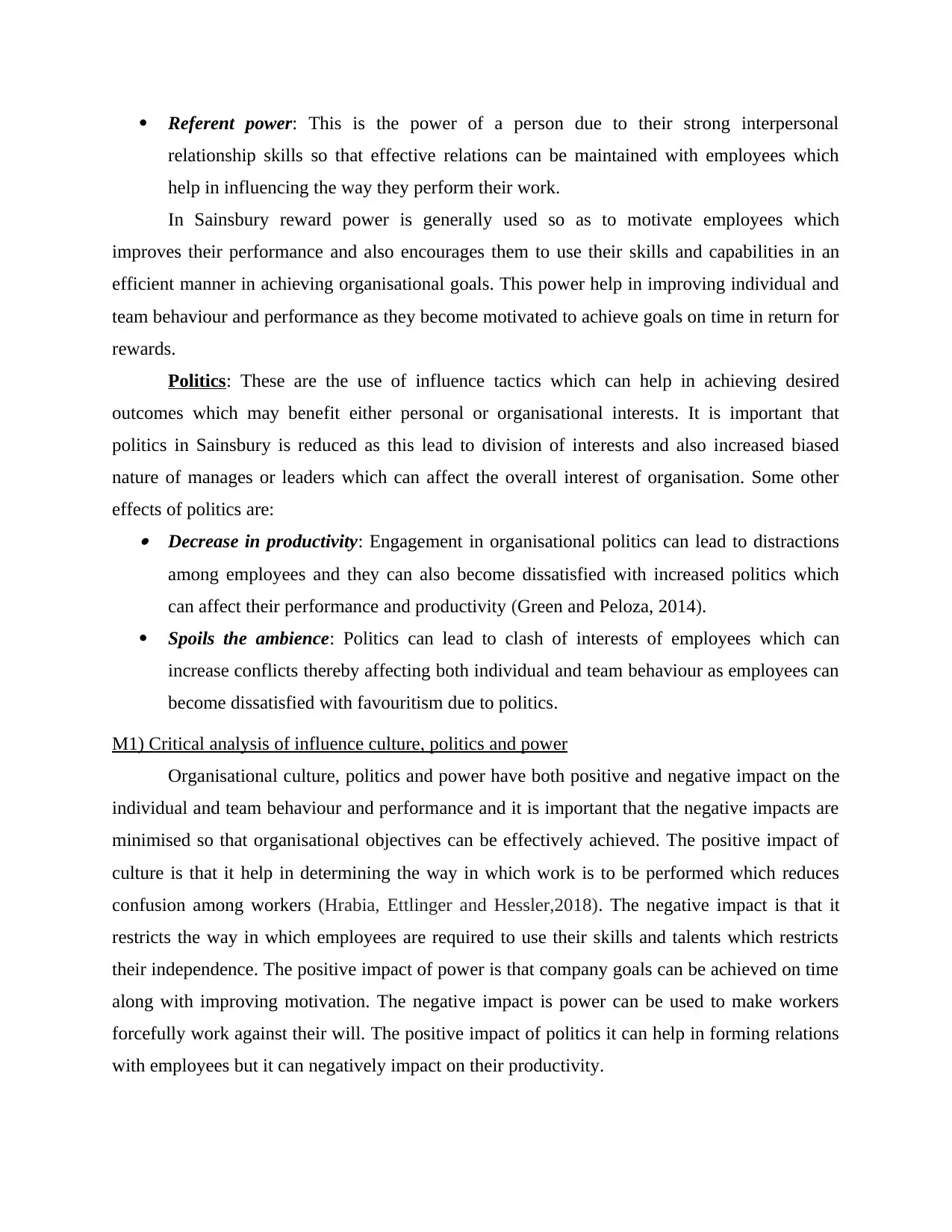
Referent power: This is the power of a person due to their strong interpersonal
relationship skills so that effective relations can be maintained with employees which
help in influencing the way they perform their work.
In Sainsbury reward power is generally used so as to motivate employees which
improves their performance and also encourages them to use their skills and capabilities in an
efficient manner in achieving organisational goals. This power help in improving individual and
team behaviour and performance as they become motivated to achieve goals on time in return for
rewards.
Politics: These are the use of influence tactics which can help in achieving desired
outcomes which may benefit either personal or organisational interests. It is important that
politics in Sainsbury is reduced as this lead to division of interests and also increased biased
nature of manages or leaders which can affect the overall interest of organisation. Some other
effects of politics are: Decrease in productivity: Engagement in organisational politics can lead to distractions
among employees and they can also become dissatisfied with increased politics which
can affect their performance and productivity (Green and Peloza, 2014).
Spoils the ambience: Politics can lead to clash of interests of employees which can
increase conflicts thereby affecting both individual and team behaviour as employees can
become dissatisfied with favouritism due to politics.
M1) Critical analysis of influence culture, politics and power
Organisational culture, politics and power have both positive and negative impact on the
individual and team behaviour and performance and it is important that the negative impacts are
minimised so that organisational objectives can be effectively achieved. The positive impact of
culture is that it help in determining the way in which work is to be performed which reduces
confusion among workers (Hrabia, Ettlinger and Hessler,2018). The negative impact is that it
restricts the way in which employees are required to use their skills and talents which restricts
their independence. The positive impact of power is that company goals can be achieved on time
along with improving motivation. The negative impact is power can be used to make workers
forcefully work against their will. The positive impact of politics it can help in forming relations
with employees but it can negatively impact on their productivity.
relationship skills so that effective relations can be maintained with employees which
help in influencing the way they perform their work.
In Sainsbury reward power is generally used so as to motivate employees which
improves their performance and also encourages them to use their skills and capabilities in an
efficient manner in achieving organisational goals. This power help in improving individual and
team behaviour and performance as they become motivated to achieve goals on time in return for
rewards.
Politics: These are the use of influence tactics which can help in achieving desired
outcomes which may benefit either personal or organisational interests. It is important that
politics in Sainsbury is reduced as this lead to division of interests and also increased biased
nature of manages or leaders which can affect the overall interest of organisation. Some other
effects of politics are: Decrease in productivity: Engagement in organisational politics can lead to distractions
among employees and they can also become dissatisfied with increased politics which
can affect their performance and productivity (Green and Peloza, 2014).
Spoils the ambience: Politics can lead to clash of interests of employees which can
increase conflicts thereby affecting both individual and team behaviour as employees can
become dissatisfied with favouritism due to politics.
M1) Critical analysis of influence culture, politics and power
Organisational culture, politics and power have both positive and negative impact on the
individual and team behaviour and performance and it is important that the negative impacts are
minimised so that organisational objectives can be effectively achieved. The positive impact of
culture is that it help in determining the way in which work is to be performed which reduces
confusion among workers (Hrabia, Ettlinger and Hessler,2018). The negative impact is that it
restricts the way in which employees are required to use their skills and talents which restricts
their independence. The positive impact of power is that company goals can be achieved on time
along with improving motivation. The negative impact is power can be used to make workers
forcefully work against their will. The positive impact of politics it can help in forming relations
with employees but it can negatively impact on their productivity.
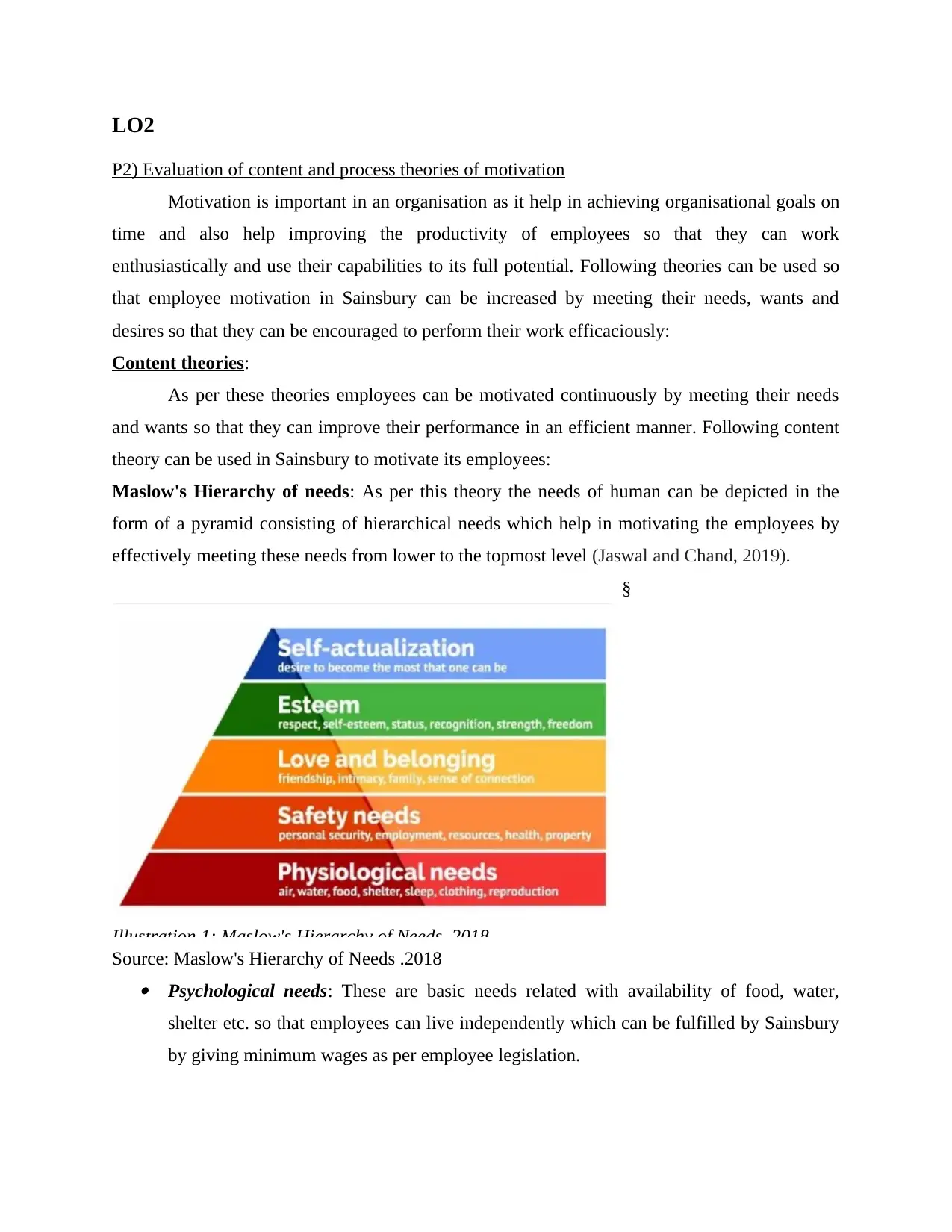
LO2
P2) Evaluation of content and process theories of motivation
Motivation is important in an organisation as it help in achieving organisational goals on
time and also help improving the productivity of employees so that they can work
enthusiastically and use their capabilities to its full potential. Following theories can be used so
that employee motivation in Sainsbury can be increased by meeting their needs, wants and
desires so that they can be encouraged to perform their work efficaciously:
Content theories:
As per these theories employees can be motivated continuously by meeting their needs
and wants so that they can improve their performance in an efficient manner. Following content
theory can be used in Sainsbury to motivate its employees:
Maslow's Hierarchy of needs: As per this theory the needs of human can be depicted in the
form of a pyramid consisting of hierarchical needs which help in motivating the employees by
effectively meeting these needs from lower to the topmost level (Jaswal and Chand, 2019).
Illustration 1: Maslow's Hierarchy of Needs .2018
§
Source: Maslow's Hierarchy of Needs .2018 Psychological needs: These are basic needs related with availability of food, water,
shelter etc. so that employees can live independently which can be fulfilled by Sainsbury
by giving minimum wages as per employee legislation.
P2) Evaluation of content and process theories of motivation
Motivation is important in an organisation as it help in achieving organisational goals on
time and also help improving the productivity of employees so that they can work
enthusiastically and use their capabilities to its full potential. Following theories can be used so
that employee motivation in Sainsbury can be increased by meeting their needs, wants and
desires so that they can be encouraged to perform their work efficaciously:
Content theories:
As per these theories employees can be motivated continuously by meeting their needs
and wants so that they can improve their performance in an efficient manner. Following content
theory can be used in Sainsbury to motivate its employees:
Maslow's Hierarchy of needs: As per this theory the needs of human can be depicted in the
form of a pyramid consisting of hierarchical needs which help in motivating the employees by
effectively meeting these needs from lower to the topmost level (Jaswal and Chand, 2019).
Illustration 1: Maslow's Hierarchy of Needs .2018
§
Source: Maslow's Hierarchy of Needs .2018 Psychological needs: These are basic needs related with availability of food, water,
shelter etc. so that employees can live independently which can be fulfilled by Sainsbury
by giving minimum wages as per employee legislation.
⊘ This is a preview!⊘
Do you want full access?
Subscribe today to unlock all pages.

Trusted by 1+ million students worldwide
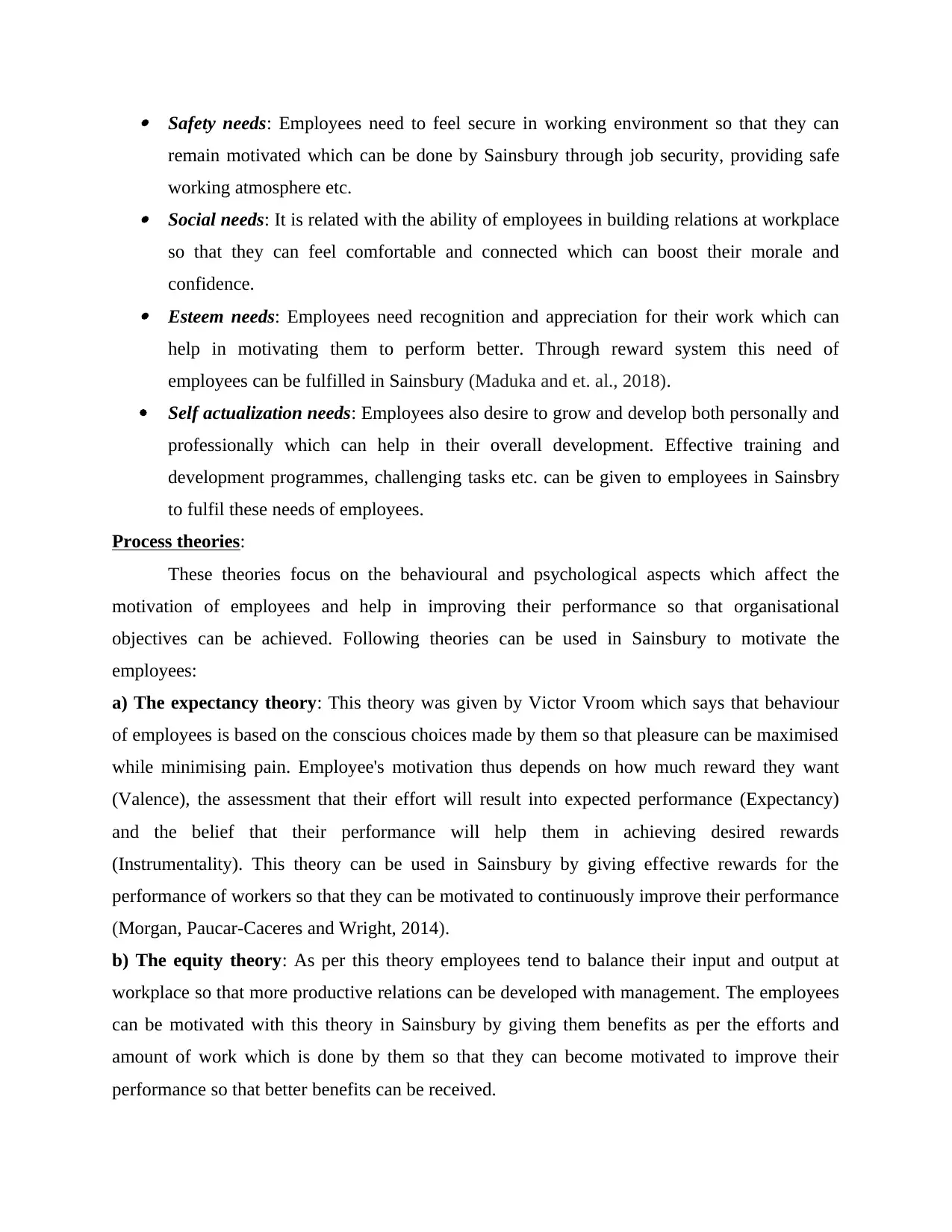
Safety needs: Employees need to feel secure in working environment so that they can
remain motivated which can be done by Sainsbury through job security, providing safe
working atmosphere etc. Social needs: It is related with the ability of employees in building relations at workplace
so that they can feel comfortable and connected which can boost their morale and
confidence. Esteem needs: Employees need recognition and appreciation for their work which can
help in motivating them to perform better. Through reward system this need of
employees can be fulfilled in Sainsbury (Maduka and et. al., 2018).
Self actualization needs: Employees also desire to grow and develop both personally and
professionally which can help in their overall development. Effective training and
development programmes, challenging tasks etc. can be given to employees in Sainsbry
to fulfil these needs of employees.
Process theories:
These theories focus on the behavioural and psychological aspects which affect the
motivation of employees and help in improving their performance so that organisational
objectives can be achieved. Following theories can be used in Sainsbury to motivate the
employees:
a) The expectancy theory: This theory was given by Victor Vroom which says that behaviour
of employees is based on the conscious choices made by them so that pleasure can be maximised
while minimising pain. Employee's motivation thus depends on how much reward they want
(Valence), the assessment that their effort will result into expected performance (Expectancy)
and the belief that their performance will help them in achieving desired rewards
(Instrumentality). This theory can be used in Sainsbury by giving effective rewards for the
performance of workers so that they can be motivated to continuously improve their performance
(Morgan, Paucar-Caceres and Wright, 2014).
b) The equity theory: As per this theory employees tend to balance their input and output at
workplace so that more productive relations can be developed with management. The employees
can be motivated with this theory in Sainsbury by giving them benefits as per the efforts and
amount of work which is done by them so that they can become motivated to improve their
performance so that better benefits can be received.
remain motivated which can be done by Sainsbury through job security, providing safe
working atmosphere etc. Social needs: It is related with the ability of employees in building relations at workplace
so that they can feel comfortable and connected which can boost their morale and
confidence. Esteem needs: Employees need recognition and appreciation for their work which can
help in motivating them to perform better. Through reward system this need of
employees can be fulfilled in Sainsbury (Maduka and et. al., 2018).
Self actualization needs: Employees also desire to grow and develop both personally and
professionally which can help in their overall development. Effective training and
development programmes, challenging tasks etc. can be given to employees in Sainsbry
to fulfil these needs of employees.
Process theories:
These theories focus on the behavioural and psychological aspects which affect the
motivation of employees and help in improving their performance so that organisational
objectives can be achieved. Following theories can be used in Sainsbury to motivate the
employees:
a) The expectancy theory: This theory was given by Victor Vroom which says that behaviour
of employees is based on the conscious choices made by them so that pleasure can be maximised
while minimising pain. Employee's motivation thus depends on how much reward they want
(Valence), the assessment that their effort will result into expected performance (Expectancy)
and the belief that their performance will help them in achieving desired rewards
(Instrumentality). This theory can be used in Sainsbury by giving effective rewards for the
performance of workers so that they can be motivated to continuously improve their performance
(Morgan, Paucar-Caceres and Wright, 2014).
b) The equity theory: As per this theory employees tend to balance their input and output at
workplace so that more productive relations can be developed with management. The employees
can be motivated with this theory in Sainsbury by giving them benefits as per the efforts and
amount of work which is done by them so that they can become motivated to improve their
performance so that better benefits can be received.
Paraphrase This Document
Need a fresh take? Get an instant paraphrase of this document with our AI Paraphraser
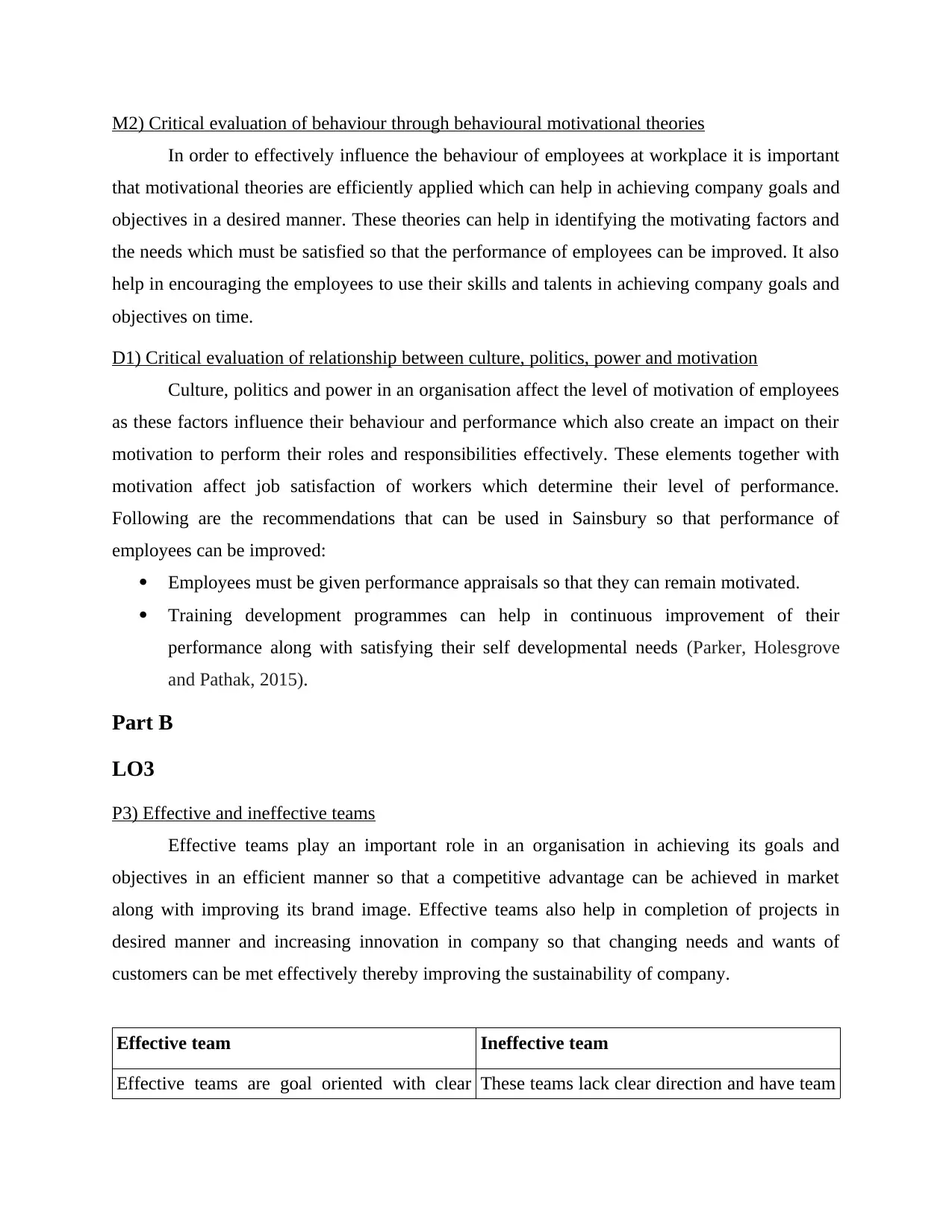
M2) Critical evaluation of behaviour through behavioural motivational theories
In order to effectively influence the behaviour of employees at workplace it is important
that motivational theories are efficiently applied which can help in achieving company goals and
objectives in a desired manner. These theories can help in identifying the motivating factors and
the needs which must be satisfied so that the performance of employees can be improved. It also
help in encouraging the employees to use their skills and talents in achieving company goals and
objectives on time.
D1) Critical evaluation of relationship between culture, politics, power and motivation
Culture, politics and power in an organisation affect the level of motivation of employees
as these factors influence their behaviour and performance which also create an impact on their
motivation to perform their roles and responsibilities effectively. These elements together with
motivation affect job satisfaction of workers which determine their level of performance.
Following are the recommendations that can be used in Sainsbury so that performance of
employees can be improved:
Employees must be given performance appraisals so that they can remain motivated.
Training development programmes can help in continuous improvement of their
performance along with satisfying their self developmental needs (Parker, Holesgrove
and Pathak, 2015).
Part B
LO3
P3) Effective and ineffective teams
Effective teams play an important role in an organisation in achieving its goals and
objectives in an efficient manner so that a competitive advantage can be achieved in market
along with improving its brand image. Effective teams also help in completion of projects in
desired manner and increasing innovation in company so that changing needs and wants of
customers can be met effectively thereby improving the sustainability of company.
Effective team Ineffective team
Effective teams are goal oriented with clear These teams lack clear direction and have team
In order to effectively influence the behaviour of employees at workplace it is important
that motivational theories are efficiently applied which can help in achieving company goals and
objectives in a desired manner. These theories can help in identifying the motivating factors and
the needs which must be satisfied so that the performance of employees can be improved. It also
help in encouraging the employees to use their skills and talents in achieving company goals and
objectives on time.
D1) Critical evaluation of relationship between culture, politics, power and motivation
Culture, politics and power in an organisation affect the level of motivation of employees
as these factors influence their behaviour and performance which also create an impact on their
motivation to perform their roles and responsibilities effectively. These elements together with
motivation affect job satisfaction of workers which determine their level of performance.
Following are the recommendations that can be used in Sainsbury so that performance of
employees can be improved:
Employees must be given performance appraisals so that they can remain motivated.
Training development programmes can help in continuous improvement of their
performance along with satisfying their self developmental needs (Parker, Holesgrove
and Pathak, 2015).
Part B
LO3
P3) Effective and ineffective teams
Effective teams play an important role in an organisation in achieving its goals and
objectives in an efficient manner so that a competitive advantage can be achieved in market
along with improving its brand image. Effective teams also help in completion of projects in
desired manner and increasing innovation in company so that changing needs and wants of
customers can be met effectively thereby improving the sustainability of company.
Effective team Ineffective team
Effective teams are goal oriented with clear These teams lack clear direction and have team
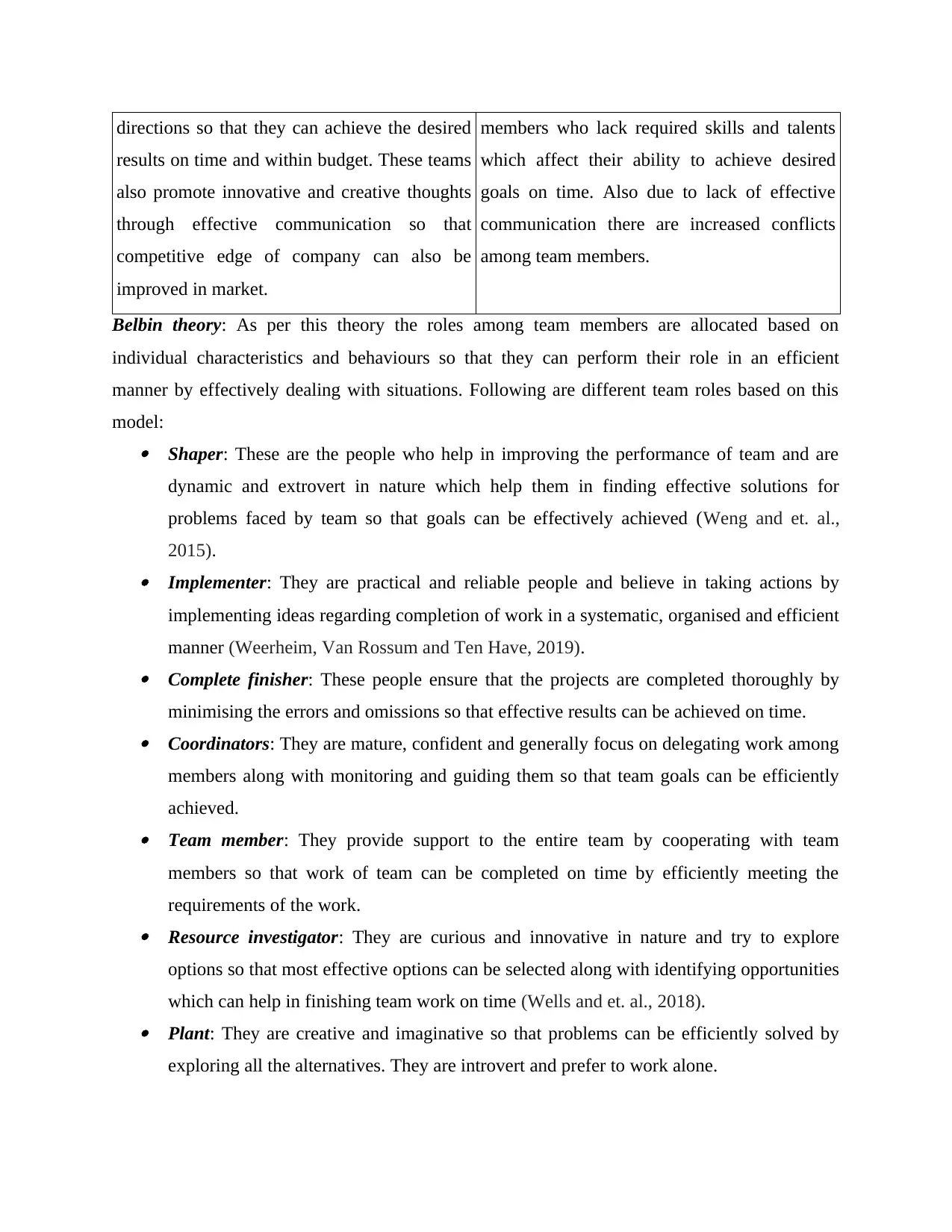
directions so that they can achieve the desired
results on time and within budget. These teams
also promote innovative and creative thoughts
through effective communication so that
competitive edge of company can also be
improved in market.
members who lack required skills and talents
which affect their ability to achieve desired
goals on time. Also due to lack of effective
communication there are increased conflicts
among team members.
Belbin theory: As per this theory the roles among team members are allocated based on
individual characteristics and behaviours so that they can perform their role in an efficient
manner by effectively dealing with situations. Following are different team roles based on this
model: Shaper: These are the people who help in improving the performance of team and are
dynamic and extrovert in nature which help them in finding effective solutions for
problems faced by team so that goals can be effectively achieved (Weng and et. al.,
2015). Implementer: They are practical and reliable people and believe in taking actions by
implementing ideas regarding completion of work in a systematic, organised and efficient
manner (Weerheim, Van Rossum and Ten Have, 2019). Complete finisher: These people ensure that the projects are completed thoroughly by
minimising the errors and omissions so that effective results can be achieved on time. Coordinators: They are mature, confident and generally focus on delegating work among
members along with monitoring and guiding them so that team goals can be efficiently
achieved. Team member: They provide support to the entire team by cooperating with team
members so that work of team can be completed on time by efficiently meeting the
requirements of the work. Resource investigator: They are curious and innovative in nature and try to explore
options so that most effective options can be selected along with identifying opportunities
which can help in finishing team work on time (Wells and et. al., 2018). Plant: They are creative and imaginative so that problems can be efficiently solved by
exploring all the alternatives. They are introvert and prefer to work alone.
results on time and within budget. These teams
also promote innovative and creative thoughts
through effective communication so that
competitive edge of company can also be
improved in market.
members who lack required skills and talents
which affect their ability to achieve desired
goals on time. Also due to lack of effective
communication there are increased conflicts
among team members.
Belbin theory: As per this theory the roles among team members are allocated based on
individual characteristics and behaviours so that they can perform their role in an efficient
manner by effectively dealing with situations. Following are different team roles based on this
model: Shaper: These are the people who help in improving the performance of team and are
dynamic and extrovert in nature which help them in finding effective solutions for
problems faced by team so that goals can be effectively achieved (Weng and et. al.,
2015). Implementer: They are practical and reliable people and believe in taking actions by
implementing ideas regarding completion of work in a systematic, organised and efficient
manner (Weerheim, Van Rossum and Ten Have, 2019). Complete finisher: These people ensure that the projects are completed thoroughly by
minimising the errors and omissions so that effective results can be achieved on time. Coordinators: They are mature, confident and generally focus on delegating work among
members along with monitoring and guiding them so that team goals can be efficiently
achieved. Team member: They provide support to the entire team by cooperating with team
members so that work of team can be completed on time by efficiently meeting the
requirements of the work. Resource investigator: They are curious and innovative in nature and try to explore
options so that most effective options can be selected along with identifying opportunities
which can help in finishing team work on time (Wells and et. al., 2018). Plant: They are creative and imaginative so that problems can be efficiently solved by
exploring all the alternatives. They are introvert and prefer to work alone.
⊘ This is a preview!⊘
Do you want full access?
Subscribe today to unlock all pages.

Trusted by 1+ million students worldwide
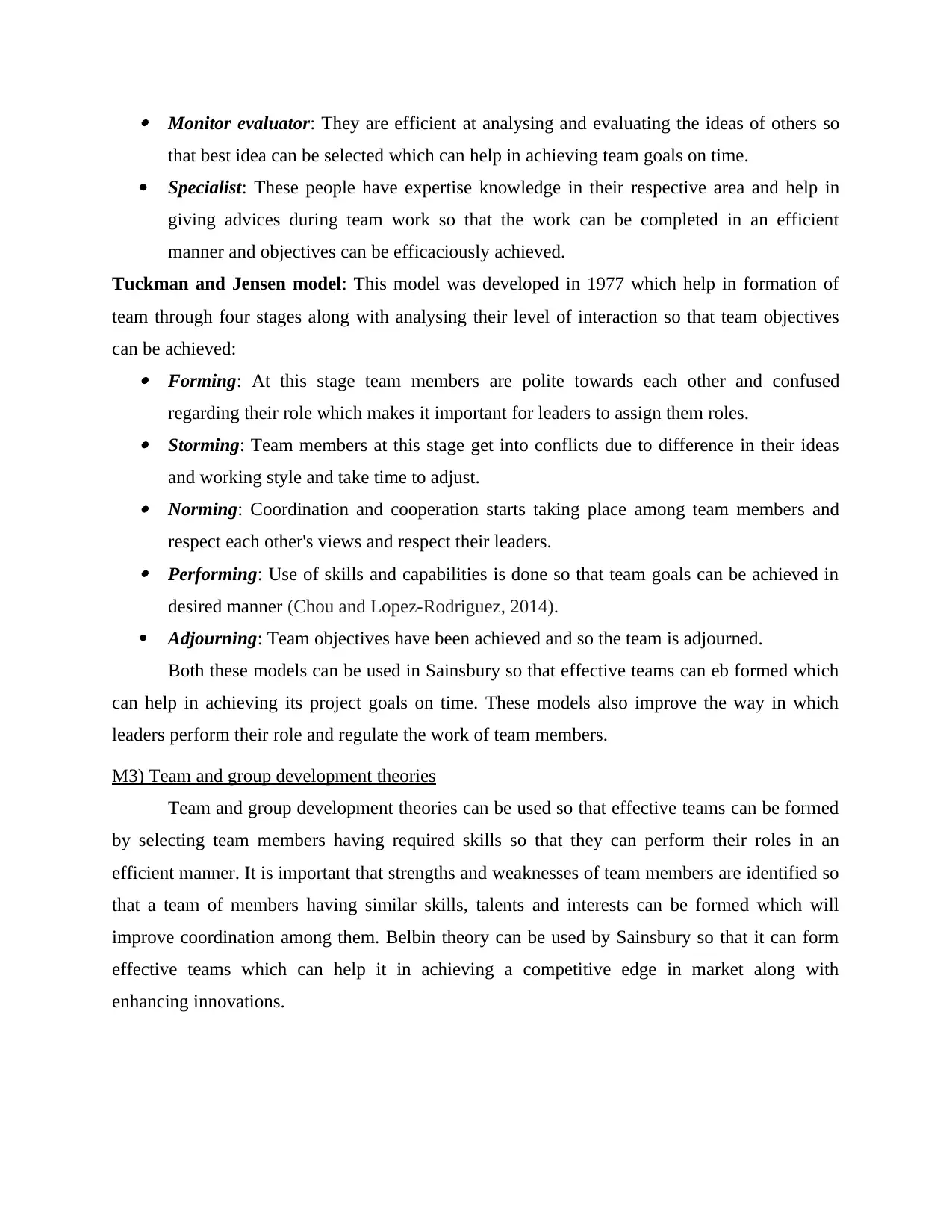
Monitor evaluator: They are efficient at analysing and evaluating the ideas of others so
that best idea can be selected which can help in achieving team goals on time.
Specialist: These people have expertise knowledge in their respective area and help in
giving advices during team work so that the work can be completed in an efficient
manner and objectives can be efficaciously achieved.
Tuckman and Jensen model: This model was developed in 1977 which help in formation of
team through four stages along with analysing their level of interaction so that team objectives
can be achieved: Forming: At this stage team members are polite towards each other and confused
regarding their role which makes it important for leaders to assign them roles. Storming: Team members at this stage get into conflicts due to difference in their ideas
and working style and take time to adjust. Norming: Coordination and cooperation starts taking place among team members and
respect each other's views and respect their leaders. Performing: Use of skills and capabilities is done so that team goals can be achieved in
desired manner (Chou and Lopez-Rodriguez, 2014).
Adjourning: Team objectives have been achieved and so the team is adjourned.
Both these models can be used in Sainsbury so that effective teams can eb formed which
can help in achieving its project goals on time. These models also improve the way in which
leaders perform their role and regulate the work of team members.
M3) Team and group development theories
Team and group development theories can be used so that effective teams can be formed
by selecting team members having required skills so that they can perform their roles in an
efficient manner. It is important that strengths and weaknesses of team members are identified so
that a team of members having similar skills, talents and interests can be formed which will
improve coordination among them. Belbin theory can be used by Sainsbury so that it can form
effective teams which can help it in achieving a competitive edge in market along with
enhancing innovations.
that best idea can be selected which can help in achieving team goals on time.
Specialist: These people have expertise knowledge in their respective area and help in
giving advices during team work so that the work can be completed in an efficient
manner and objectives can be efficaciously achieved.
Tuckman and Jensen model: This model was developed in 1977 which help in formation of
team through four stages along with analysing their level of interaction so that team objectives
can be achieved: Forming: At this stage team members are polite towards each other and confused
regarding their role which makes it important for leaders to assign them roles. Storming: Team members at this stage get into conflicts due to difference in their ideas
and working style and take time to adjust. Norming: Coordination and cooperation starts taking place among team members and
respect each other's views and respect their leaders. Performing: Use of skills and capabilities is done so that team goals can be achieved in
desired manner (Chou and Lopez-Rodriguez, 2014).
Adjourning: Team objectives have been achieved and so the team is adjourned.
Both these models can be used in Sainsbury so that effective teams can eb formed which
can help in achieving its project goals on time. These models also improve the way in which
leaders perform their role and regulate the work of team members.
M3) Team and group development theories
Team and group development theories can be used so that effective teams can be formed
by selecting team members having required skills so that they can perform their roles in an
efficient manner. It is important that strengths and weaknesses of team members are identified so
that a team of members having similar skills, talents and interests can be formed which will
improve coordination among them. Belbin theory can be used by Sainsbury so that it can form
effective teams which can help it in achieving a competitive edge in market along with
enhancing innovations.
Paraphrase This Document
Need a fresh take? Get an instant paraphrase of this document with our AI Paraphraser
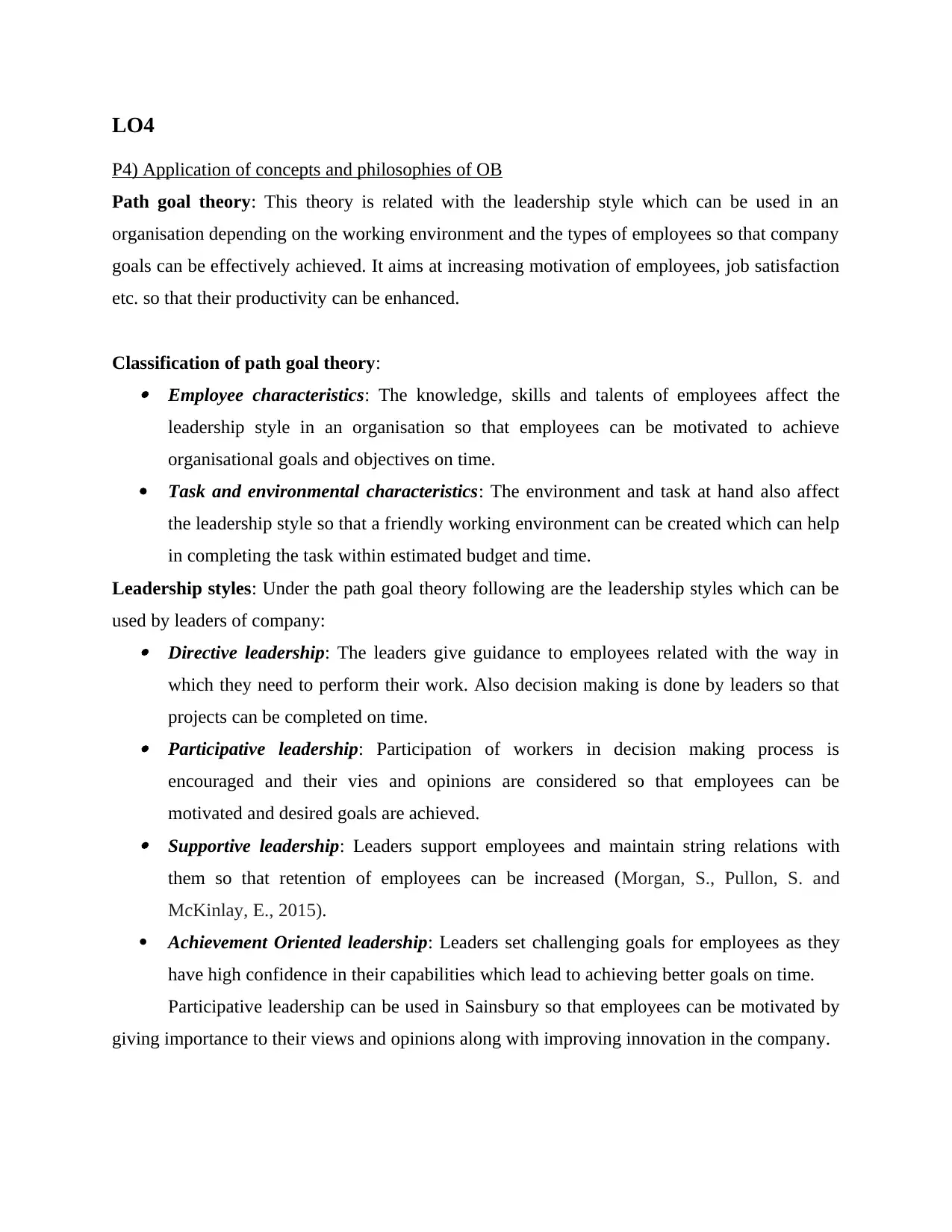
LO4
P4) Application of concepts and philosophies of OB
Path goal theory: This theory is related with the leadership style which can be used in an
organisation depending on the working environment and the types of employees so that company
goals can be effectively achieved. It aims at increasing motivation of employees, job satisfaction
etc. so that their productivity can be enhanced.
Classification of path goal theory: Employee characteristics: The knowledge, skills and talents of employees affect the
leadership style in an organisation so that employees can be motivated to achieve
organisational goals and objectives on time.
Task and environmental characteristics: The environment and task at hand also affect
the leadership style so that a friendly working environment can be created which can help
in completing the task within estimated budget and time.
Leadership styles: Under the path goal theory following are the leadership styles which can be
used by leaders of company: Directive leadership: The leaders give guidance to employees related with the way in
which they need to perform their work. Also decision making is done by leaders so that
projects can be completed on time. Participative leadership: Participation of workers in decision making process is
encouraged and their vies and opinions are considered so that employees can be
motivated and desired goals are achieved. Supportive leadership: Leaders support employees and maintain string relations with
them so that retention of employees can be increased (Morgan, S., Pullon, S. and
McKinlay, E., 2015).
Achievement Oriented leadership: Leaders set challenging goals for employees as they
have high confidence in their capabilities which lead to achieving better goals on time.
Participative leadership can be used in Sainsbury so that employees can be motivated by
giving importance to their views and opinions along with improving innovation in the company.
P4) Application of concepts and philosophies of OB
Path goal theory: This theory is related with the leadership style which can be used in an
organisation depending on the working environment and the types of employees so that company
goals can be effectively achieved. It aims at increasing motivation of employees, job satisfaction
etc. so that their productivity can be enhanced.
Classification of path goal theory: Employee characteristics: The knowledge, skills and talents of employees affect the
leadership style in an organisation so that employees can be motivated to achieve
organisational goals and objectives on time.
Task and environmental characteristics: The environment and task at hand also affect
the leadership style so that a friendly working environment can be created which can help
in completing the task within estimated budget and time.
Leadership styles: Under the path goal theory following are the leadership styles which can be
used by leaders of company: Directive leadership: The leaders give guidance to employees related with the way in
which they need to perform their work. Also decision making is done by leaders so that
projects can be completed on time. Participative leadership: Participation of workers in decision making process is
encouraged and their vies and opinions are considered so that employees can be
motivated and desired goals are achieved. Supportive leadership: Leaders support employees and maintain string relations with
them so that retention of employees can be increased (Morgan, S., Pullon, S. and
McKinlay, E., 2015).
Achievement Oriented leadership: Leaders set challenging goals for employees as they
have high confidence in their capabilities which lead to achieving better goals on time.
Participative leadership can be used in Sainsbury so that employees can be motivated by
giving importance to their views and opinions along with improving innovation in the company.
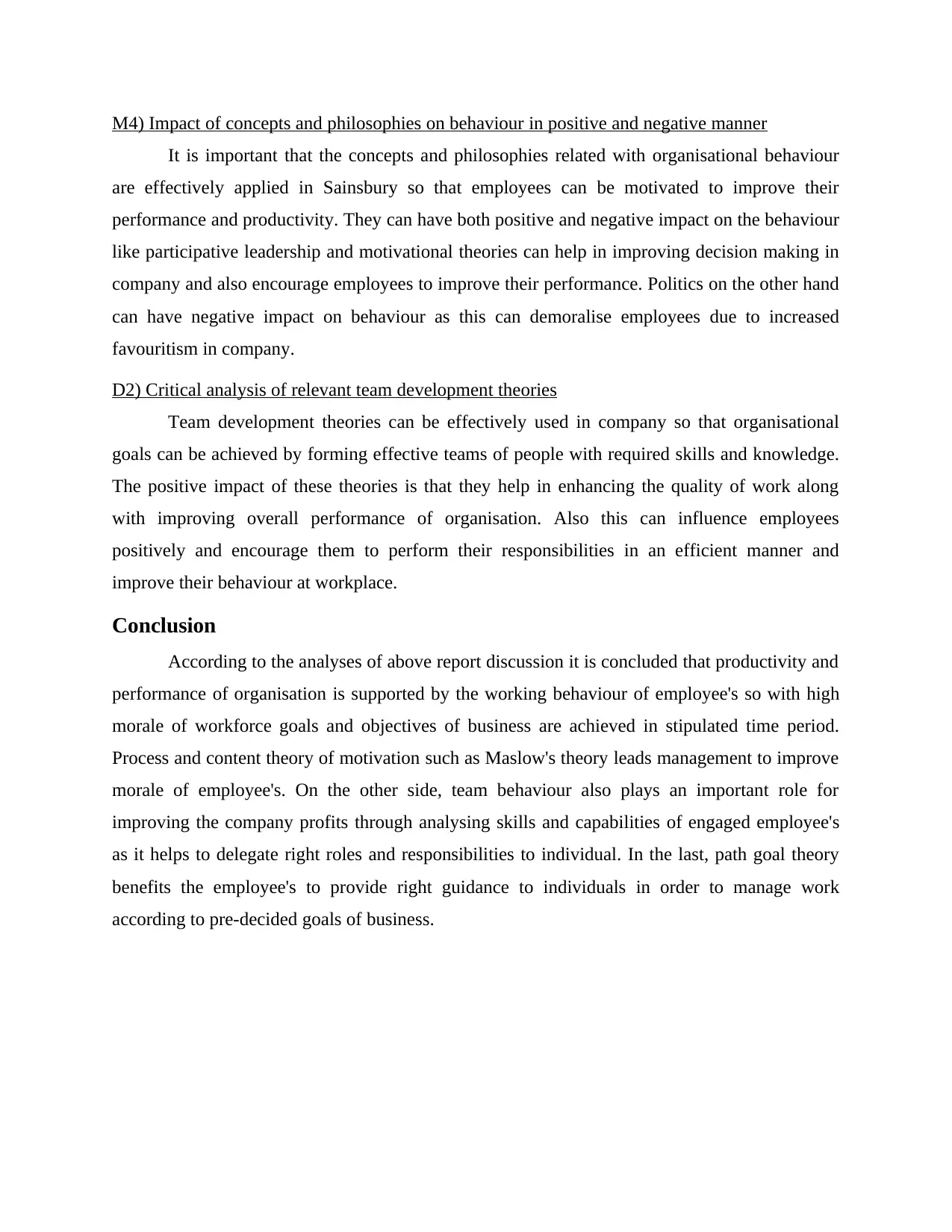
M4) Impact of concepts and philosophies on behaviour in positive and negative manner
It is important that the concepts and philosophies related with organisational behaviour
are effectively applied in Sainsbury so that employees can be motivated to improve their
performance and productivity. They can have both positive and negative impact on the behaviour
like participative leadership and motivational theories can help in improving decision making in
company and also encourage employees to improve their performance. Politics on the other hand
can have negative impact on behaviour as this can demoralise employees due to increased
favouritism in company.
D2) Critical analysis of relevant team development theories
Team development theories can be effectively used in company so that organisational
goals can be achieved by forming effective teams of people with required skills and knowledge.
The positive impact of these theories is that they help in enhancing the quality of work along
with improving overall performance of organisation. Also this can influence employees
positively and encourage them to perform their responsibilities in an efficient manner and
improve their behaviour at workplace.
Conclusion
According to the analyses of above report discussion it is concluded that productivity and
performance of organisation is supported by the working behaviour of employee's so with high
morale of workforce goals and objectives of business are achieved in stipulated time period.
Process and content theory of motivation such as Maslow's theory leads management to improve
morale of employee's. On the other side, team behaviour also plays an important role for
improving the company profits through analysing skills and capabilities of engaged employee's
as it helps to delegate right roles and responsibilities to individual. In the last, path goal theory
benefits the employee's to provide right guidance to individuals in order to manage work
according to pre-decided goals of business.
It is important that the concepts and philosophies related with organisational behaviour
are effectively applied in Sainsbury so that employees can be motivated to improve their
performance and productivity. They can have both positive and negative impact on the behaviour
like participative leadership and motivational theories can help in improving decision making in
company and also encourage employees to improve their performance. Politics on the other hand
can have negative impact on behaviour as this can demoralise employees due to increased
favouritism in company.
D2) Critical analysis of relevant team development theories
Team development theories can be effectively used in company so that organisational
goals can be achieved by forming effective teams of people with required skills and knowledge.
The positive impact of these theories is that they help in enhancing the quality of work along
with improving overall performance of organisation. Also this can influence employees
positively and encourage them to perform their responsibilities in an efficient manner and
improve their behaviour at workplace.
Conclusion
According to the analyses of above report discussion it is concluded that productivity and
performance of organisation is supported by the working behaviour of employee's so with high
morale of workforce goals and objectives of business are achieved in stipulated time period.
Process and content theory of motivation such as Maslow's theory leads management to improve
morale of employee's. On the other side, team behaviour also plays an important role for
improving the company profits through analysing skills and capabilities of engaged employee's
as it helps to delegate right roles and responsibilities to individual. In the last, path goal theory
benefits the employee's to provide right guidance to individuals in order to manage work
according to pre-decided goals of business.
⊘ This is a preview!⊘
Do you want full access?
Subscribe today to unlock all pages.

Trusted by 1+ million students worldwide
1 out of 14
Related Documents
Your All-in-One AI-Powered Toolkit for Academic Success.
+13062052269
info@desklib.com
Available 24*7 on WhatsApp / Email
![[object Object]](/_next/static/media/star-bottom.7253800d.svg)
Unlock your academic potential
Copyright © 2020–2026 A2Z Services. All Rights Reserved. Developed and managed by ZUCOL.




